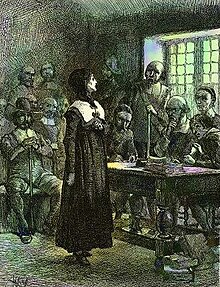ANNE HUTCHINSON
 |
| Portrait of Anne Hutchinson |
What specifically is it that sets me apart from the other women of her time? I, unlike other women of my time, was not passive or submissive; however, I proved to be one
of the first prominent female figures within Colonial History for openly going
against the Boston Church.
 |
| Anne Hutchinson statue in Rhode Island |
I born Anne Marbury in
Lincolnshire, England in 1591 and was the daughter of an Anglican minister, Francis
Marbury. Marbury, my father, felt that the clergy
should be well educated clashed with common ideas at the time and was
imprisoned years before my birth, in 1580, he was released, he then preached
and taught in the small market town of Alford, by 1585 he became schoolmaster
at the local Grammar School. I was the third child out of fifteen, my father’s influence, provided me with a powerful insight to a better education
than most girls my age. A female during the 16th century within
England, was privileged with education only if their family held a high social position;
education, at the time was offered exclusively to and dominated by males. My father died in
1611, in 1612 I William Hutchinson, my husband and I were exposed to preacher John
Cotton; an English clergyman and colonist. Cotton moved to Boston, New England
where he would study to become a minster,we were so inspired by Cotton that we decided to make the dangerous trip into the New World. I was specifically interested in Cotton’s theology of “absolute grace”, and his
thoughts on the “elect”, “law”, and “work”; and saw myself as a participant in
the power of the Almighty. Through this ideology, I was given a voice; an
actual method of existing beyond the control of male “superiority”.
 |
| TRIAL |
My family of ten, arrived in Boston in the Summer of 1634, where we purchased half an acre creating one of the largest houses on the peninsula, in present
day downtown Boston. Once in Boston, I became a midwife, assisting women
during childbirth- within the New World twenty-percent of women died during
childcare. I also created a Home Bible study group, for women, and later men,
who wanted to discuss Cotton’s sermons, hosting at least sixty people on a
weekly basis. Within my meetings I started to question the validity behind the
legitimacy of the “elect”, stating that “an intuition of the Spirit” s was the only way to go through the gates of Heaven. However,
ministers of the Boston Church began to oppose my so called “unauthorized” religious
meetings that could confuse the faithful. In 1636, John Winthrop stated that I committed two errors: that the “holy Ghost” dwells in a justified person, and “that
no sanctification can help to evidence our justification”. In late 1636 my followers and I were accused of having committed two heresies
against the Puritan Church; antinomism and familism. In November 1637, I was put on civil trial
by the General Court on the charge of damaging the minsters reputations, found
guilty and put under house arrest. March 1638 marked my Church , which lasted nine hours; however, I was excommunicated (banished) from
Massachusetts and made my way into Rhode Island along with Roger Williams.
I like this, you have a good balance between the facts and her emotion, you handled it well. I did it on Anne Hutchinson too... may the best Anne win -__-
ReplyDeleteThanks "Pinneaples", the same goes to you as well. :)
DeleteLove your blog. The picture and the video really makes your blog an eye catcher and I like your entry you really show her emotions.
ReplyDeleteThank you very much. :)
Delete